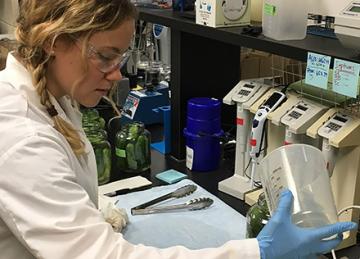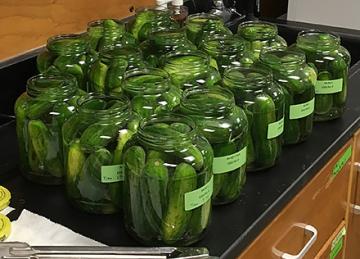In a Pickle: Benefits of Fermented Cucumbers

Jennifer Fideler, a graduate research assistant at ARS's Food Science Research Unit, packs pickles in jars. (ARS, D4185-1)
Craving a pickle? Go ahead and take a bite. Fermented vegetables are a healthy choice for a snack.
Cucumber pickles are the most commonly consumed fermented vegetable in the United States, with Americans consuming more than 9 pounds of all types of pickles per person each year. Pickles are fat free, cholesterol free, low in calories, and a good source of vitamin K.
But there’s not much scientific evidence that tells us whether fermented cucumbers are more healthful than raw ones.
Research on potential health benefits of fermented foods has mainly focused on ingestion of live microorganisms and the subsequent probiotic effects, says Suzanne Johanningsmeier, research food technologist at the Agricultural Research Service (ARS) Food Science Research Unit in Raleigh, North Carolina. More recently, emphasis has been placed on health-promoting compounds called bioactive peptides, which are short chains of amino acids, found in fermented foods.
Peptides that have therapeutic properties are well documented in many fermented foods, including dairy products, sourdough, and cured meats—but not in fermented vegetables, Johanningsmeier says. One reason could be that cucumber pickles are difficult to analyze with existing peptide methods because of their salt content. So Johanningsmeier and her graduate research assistant, Jennifer Fideler, partnered with North Carolina State University researchers, who developed a novel mass spectrometry technique that allowed the pickle components to be analyzed despite the salt content.

ARS scientists identified peptides, known to have anti-hypertensive properties, in fermented cucumbers. (ARS, D4185-1)
Using this technology, scientists identified, for the first time in fermented cucumbers, four peptides known to have anti-hypertensive properties. “This discovery supports the historical view of the healthfulness of these products,” Johanningsmeier says. “Although these peptides were present at low concentrations compared to other food components, they may enhance the healthfulness of the products because of their high potency.”
The discovery of these peptides in fermented cucumbers may be good news for consumers seeking healthy foods. There’s also the possibility of recovering these peptides from surplus fermentation brines for use as functional ingredients. But all this remains to be seen.
“This initial study looked at whether there was a unique contribution of the fermentation process to the formation of health-promoting compounds,” Johanningsmeier says. “We’re just getting started with this line of research. In the end, we may find just as many healthy constituents in other types of pickled vegetables. Further research is needed to determine if these compositional changes during fermentation are in sufficient quantities for a health benefit.”
This research was published in the Journal of Food Chemistry in 2019.—By Sandra Avant, ARS Office of Communications.

